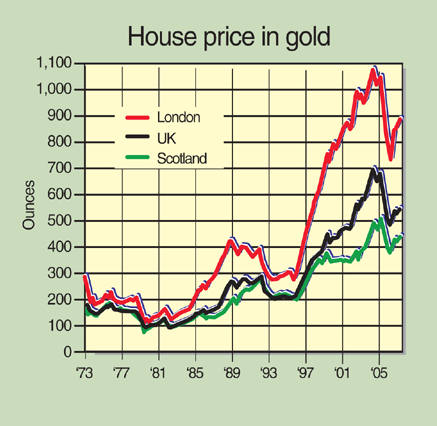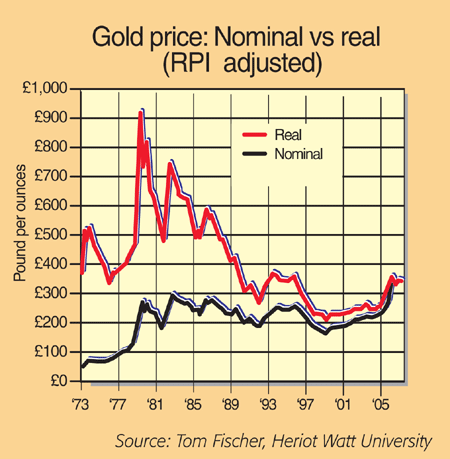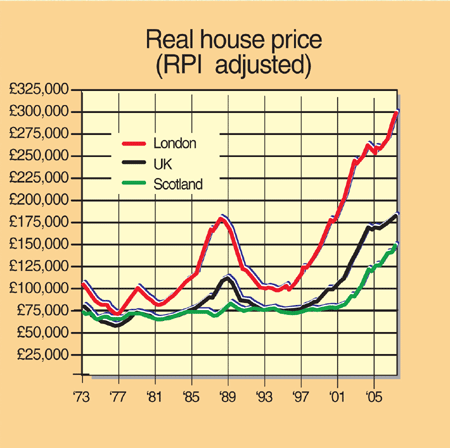Get the latest financial news, insights and expert analysis from our award-winning MoneyWeek team, to help you understand what really matters when it comes to your finances.
You are now subscribed
Your newsletter sign-up was successful
Want to add more newsletters?

Twice daily
MoneyWeek
Get the latest financial news, insights and expert analysis from our award-winning MoneyWeek team, to help you understand what really matters when it comes to your finances.

Four times a week
Look After My Bills
Sign up to our free money-saving newsletter, filled with the latest news and expert advice to help you find the best tips and deals for managing your bills. Start saving today!
As you can see from the chart below, measured in gold the UK housing market peaked in the second half of 2004, with the average UK house (AUKH) costing the equivalent of 695 ounces of gold.
It has been in a bear market ever since: right now, with gold at £380 per ounce and the AUKH at £184,131, you can buy that house for 485 ounces.
I'll say that again using loaded language: as measured by the oldest, purest, most inflation-resistant form of money, the UK housing market has declined by 30% since 2004.
MoneyWeek
Subscribe to MoneyWeek today and get your first six magazine issues absolutely FREE

Sign up to Money Morning
Don't miss the latest investment and personal finances news, market analysis, plus money-saving tips with our free twice-daily newsletter
Don't miss the latest investment and personal finances news, market analysis, plus money-saving tips with our free twice-daily newsletter

So what next? Well, the lowest house prices have been since 1973 in terms of gold has been about 80 ounces. I can't see us getting quite that low again, but 200 ounces of gold for an AUKH isn't impossible. Indeed, a chartist would say that as it would merely mean retracing to the break-out point' it is really very likely.
How might it happen? Let's say, over the next three years, the US and the UK continue to inflate their money supplies at the same rates they are now (see chart below) and the rush to hard assets consequently gathers pace. Meanwhile, the credit crunch hits the profits of the UK banks and forces them to improve lending standards. Gordon Brown pressures the Bank Of England to lower rates, which it does, but mortgage lending rates don't come down correspondingly (due to the banks' need to make some real money) and the flood of easy money that has gone into housing continues to dry up. The housing market comes under selling pressure and, as the leading builders' stocks have already, retraces the 15% gains it has made since August 2005, back to an AUKH of £157,000.

**GOLD PRICE CHART
Meanwhile, the rules regulating non-doms change, hence rich foreigners stop using the UK as a tax haven. With the number-one thing propping up our economy gone, sentiment changing, and interest rates falling, foreign money stops coming into the UK and sterling gets sold off. In this kind of scenario, we could see gold more than doubling in pounds. Add that to a 15% fall in house prices in sterling terms and you've got an AUKH costing 207 ounces, 57% less than it does now.
And what if it's worse? What happens if UK housing is so taken by bearish sentiment (maybe we get a repeat of 1989-1994) that it becomes undervalued; in the meantime, we get a run on the dollar as in 1979 (perhaps the US invades another Middle Eastern country) and gold spikes to overvalued levels?
It may not happen, of course. Gold could go down, along with house prices, leaving me stranded in a rented house in Clapham. But my guess is that in a few years those of us who chose gold over houses in 2007 will be happily ensconced in Chelsea.

Get the latest financial news, insights and expert analysis from our award-winning MoneyWeek team, to help you understand what really matters when it comes to your finances.
MoneyWeek is written by a team of experienced and award-winning journalists, plus expert columnists. As well as daily digital news and features, MoneyWeek also publishes a weekly magazine, covering investing and personal finance. From share tips, pensions, gold to practical investment tips - we provide a round-up to help you make money and keep it.
-
 Should you buy an active ETF?
Should you buy an active ETF?ETFs are often mischaracterised as passive products, but they can be a convenient way to add active management to your portfolio
-
 Power up your pension before 5 April – easy ways to save before the tax year end
Power up your pension before 5 April – easy ways to save before the tax year endWith the end of the tax year looming, pension savers currently have a window to review and maximise what’s going into their retirement funds – we look at how

